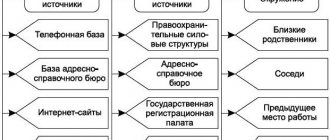Alimony obligations are subject to regular payment in accordance with a court decision or an agreement signed between the parties. However, not all of them are executed properly, as a result of which the payer may incur a debt. Sometimes a debt arises for reasons beyond the payer’s control, but in some cases he, of his own free will, refuses to fulfill his obligations. For such situations, a procedure for searching for alimony debtors was introduced.
Dear readers! The article talks about typical ways to resolve legal issues, but each case is individual. If you want to find out how to solve your particular problem , contact a consultant:
+7 (499) 938-81-90 (Moscow)
+7 (812) 467-32-77 (Saint Petersburg)
8 (800) 301-79-36 (Regions)
APPLICATIONS AND CALLS ARE ACCEPTED 24/7 and 7 days a week.
It's fast and FREE !
Is there a process in place?
Failure to pay alimony even after a court decision has been made and enforcement proceedings have been initiated is a case that often arises in practice. However, the execution of a judicial act is hampered by the lack of information about the exact location of the debtor.
For such cases, the legislator has provided for a procedure for searching the debtor, which serves the purpose of bringing him to justice and forcing him to fulfill his obligations.
How to recognize a debtor as missing?
If the debtor has been wanted for more than a year and there is no information about him, then he can be considered missing (Article 42 of the Civil Code of the Russian Federation). This will allow you to issue a survivor's pension for the child instead of alimony.
The recognition procedure is carried out in court and looks like this:
- The plaintiff (claimant) files a statement of claim with the district court at his place of registration or residence.
- When considering a claim, the judge requests information from the FSSP and other government agencies to find out about the latest actions of the absent citizen.
- A court date is set. The case is considered with the participation of the prosecutor's office.
- If there is no information about the location of the debtor, then the court will satisfy the request.
- The court decision is sent to the plaintiff and to the registry office.
- A trustee is appointed for the debtor's property.
After 30 days, the court decision will enter into legal force and the mother can contact the Pension Fund office to apply for a pension.
When is it performed?
The search for alimony defaulters can begin only after enforcement proceedings have been initiated.
After the initiation of proceedings, the bailiff performs all necessary actions, including notifying the debtor of the initiation of proceedings at the last known address. Further, if the debtor is not at the address and it is impossible to locate him, a search procedure is initiated.
A search may not be announced if the debtor's property, for example, bank accounts, was discovered. The debt is collected from the accounts, so there is no need to initiate a search.
How is the amount of alimony calculated? The answer is presented in the article “How to calculate child support.” What constitutes an application for alimony without divorce in 2021 can be found out here.
⚡ What to do if the search does not produce results?
Unfortunately, in 2021, changes were made to the legislation on enforcement proceedings, according to which the bailiff, if he was unable to find the debtor, only informs the collector about unsuccessful search attempts. And now you have to carry out the search yourself. In the same case, if the claimant wants to achieve at least some result, he can apply to the court with a statement of claim to recognize the debtor as missing. In this case, if the court accepts such a case for consideration, you can count on the state to take over alimony payments.
Raid "Debtor". Can the traffic police and bailiffs take away the car?
Read
5 ways to check the debts of individuals
More details
How to behave if stopped by traffic police
Look
How does the search procedure for alimony debtors work?
In the event that collection is hampered by the impossibility of locating the debtor’s property or himself, and he does not respond to demands sent to the last known address, the bailiff working on enforcement proceedings may begin the search procedure (both at his own request and in accordance with the claimant’s application) .
Methods
The debtor can be found either independently or with the help of the bailiff service.
The effectiveness of each method may vary depending on the specific situation.
On one's own
Before you find out who is searching for the alimony debtor, you can try to find him yourself.
To do this, you can use the following options:
- Search for the debtor through the tax service (for example, if he is an entrepreneur, you can find out his registered address).
- Search for the debtor through the traffic police (you can find out information about vehicles).
- Through mutual friends, as well as through relatives.
- Via the Internet (for example, on social networks).
It is advisable to transfer all information received to the bailiff service if the debtor refuses to make contact.
With the help of bailiffs
A search can be declared on two grounds:
- At the initiative of the claimant. In this case, he needs to submit a corresponding application, which will be considered by the bailiff.
- On the initiative of the bailiff. He can independently issue a search order if necessary.
The bailiff carries out the following actions to carry out the search:
- Draws up an action plan.
- Makes requests to the police.
- Controls the search process.
- Carry out various requests to government agencies in order to obtain information about the debtor and his property.
Inquiries are also made to various banks and financial institutions to search for accounts or deposits of the debtor.
Search options
After initiating the search procedure for the debtor and his property, the bailiff can carry out a number of actions aimed at determining the location of the debtor and searching for his property.
The search can be carried out in several ways.
Database
To announce a search, first of all, the bailiff checks information about the debtor in the service database, which contains information about all debtors and collectors.
Any citizen can obtain information about debtors. To do this, you must enter the details of the alleged debtor on the bailiff service website.
By full name
You can search for a debtor by name on several resources.
- Bailiff service website. To do this, you need to enter the debtor’s data in a special service that contains information about debtors.
- Government services portal. To use it, you must register, then request information about whether enforcement proceedings have been initiated against the person.
- Through personal contact with the bailiff service.
- Through applications (applications from the bailiff service, which allow you to search for information from their database, are available on social networks, as well as for various mobile devices).
- Using judicial websites (city (district) or world). This way you can find out information about the debtor’s participation in court proceedings.
By submitting an application by mail
An interested person can obtain information about the debtor by sending an application for information to the relevant authorities via mail.
It is recommended to send a letter with a notification, as well as a description of the attachment.
Is it possible to collect alimony arrears? The answer is presented in the article “Is it possible to receive alimony retroactively?” Is it possible to apply for alimony while in a civil marriage? Find out here.
Submitting an application
The claimant may not wait for the bailiff to start the search and try to initiate the procedure by filing an application.
To do this, you must submit a corresponding application to the bailiff service. If there are grounds for the search, the bailiff will begin it; if not, he will refuse the application.
Structure
The application for searching the debtor must contain the following information:
- Details of the applicant (claimant).
- Data from the department of bailiffs and bailiffs working on a specific case.
- Details of the debtor.
- Link to the document on the basis of which enforcement actions are carried out.
- An indication of the debtor's evasion or lack of information about him.
- Search request.
- Other information relevant to the case (for example, information about the debtor).
- List of applications.
- Applicant's signature.
Duration of the proceedings
After filing the application, the bailiff will have a period of three months to make a decision. After this, he will either issue a search order or refuse if there are no grounds.
The search can be started only after the bailiff issues a ruling.
Making a decision
A search order is issued either on the basis of an application from the claimant or on the basis of a decision of the bailiff.
In any case, interested parties can appeal this decision both in court and in a higher authority.
Institutions where requests are submitted
After the search procedure begins, the bailiff sends requests:
- Contact the Federal Migration Service for information about the place of registration of the debtor.
- To Rosreestr, in order to find real estate.
- To the traffic police to find his vehicle.
- To banks and other financial institutions.
- To the pension fund to find the debtor's place of work.
- To the tax service.
In addition, the bailiff can interview neighbors at the debtor’s last place of residence, find his relatives, and review information from social networks.
Refusal to search
The IPI’s refusal to carry out a search must be in writing; the applicant can appeal such a decision by contacting:
- To the senior bailiff - the head of the territorial unit.
- To the regional department of the FSSP.
- To the prosecutor's office (if there is evidence that the SPI is acting in violation - for example, he received a bribe from the debtor, is in a family relationship with him, and in other cases).
- To the court with a complaint about the inaction or actions of the bailiff.
When applying to any of the listed authorities, you must indicate the date of filing the application, what the violations committed by the IPI (actions or inactions) were expressed in, as well as references to the violated (contested) legal norms. To file a complaint, it is better to get advice from experienced lawyers on this issue.
Find out more about the procedure for appealing the actions or inaction of a bailiff here.
What should the defendant do?
Sanctions can be applied against the debtor only when he is discovered.
The debtor has the right to appeal any actions of the bailiff if he has grounds.
What portion of the salary is calculated for alimony? The answer is presented in the article “What percentage of salary is alimony.” How alimony is collected for maintaining a wife for up to 3 years can be found here.
In case of evasion of obligations
The debtor is not recommended to evade the bailiff's demands, otherwise he may be recognized as a willful defaulter. Various sanctions may be applied to him, including deprivation of the right to drive a car and the imposition of fines.
In case of malicious evasion, the debtor may also be subject to criminal liability (maximum penalty - imprisonment for up to one year).
Administrative and criminal liability
Obligations must be fulfilled properly or you will have to bear responsibility for their violation. Administrative liability is determined for debtors - compulsory work, administrative arrest, fines.
According to Art. 157 of the Criminal Code provides for mandatory and corrective labor in the event of repeated refusal to pay funds for children.
Bailiffs also restrict the right to drive a vehicle and travel abroad in the event of debt formation.
The legislative framework
Issues related to alimony obligations are provided for by the Family Code of the Russian Federation. It contains the foundations of this institution, defines the responsibilities of relatives, the limits of such obligations, and so on.
Issues of forced collection of alimony are regulated by the Federal Law “On Enforcement Proceedings”. This law fully answers the questions that arise during enforcement proceedings related to the collection of alimony arrears.
Also, liability for evading payment of alimony is regulated by the norms of the Code of Criminal Procedure and the Criminal Code. They contain sanctions for evasion and malicious evasion from fulfilling their duties, as well as the elements of these offenses.
Alimony obligations must be fulfilled on time. Otherwise, if the debtor’s guilt is proven, he faces liability for evasion of payment, even criminal liability. But the fact of being held accountable does not solve the problem of unpaid debt. It is necessary to carry out a number of activities within the framework of enforcement proceedings, including the search for alimony debtors, which is done in practice.
Bringing the debtor to justice
If the claimant turns to the FSSP in order to find the defaulter, then this already indicates that evasion of alimony has acquired a malicious nature. In this case, the bailiff must not only search for the defaulter, but if the result is positive, bring him to justice. First of all, administrative measures are applied to the debtor. It could be:
- Ban on traveling abroad;
- Revocation of driver's license;
- Fine up to 25,000 rubles;
- Community service up to 150 hours.
But if the above measures do not have the desired effect on the payer, then all that remains is to bring him to criminal liability. This is possible if alimony has not been paid for more than a year, the debtor provides false information about his income and location, ignores orders and hides from the bailiff. Measures of criminal liability for non-payment of alimony include (Article 157 of the Criminal Code of the Russian Federation):
- Correctional work;
- Arrest for 15 days;
- Imprisonment for up to 1 year.
They can be held criminally liable only after a court decision has been made. However, as practice shows, the use of criminal measures against alimony debtors is extremely rare, in contrast to administrative liability. But if the amount of the debt is quite large and the alimony payer does not have the opportunity to pay it off or he refuses, then, on the basis of a resolution of the FSSP, the property registered in his name can be seized and sold in order to compensate for the debt.









